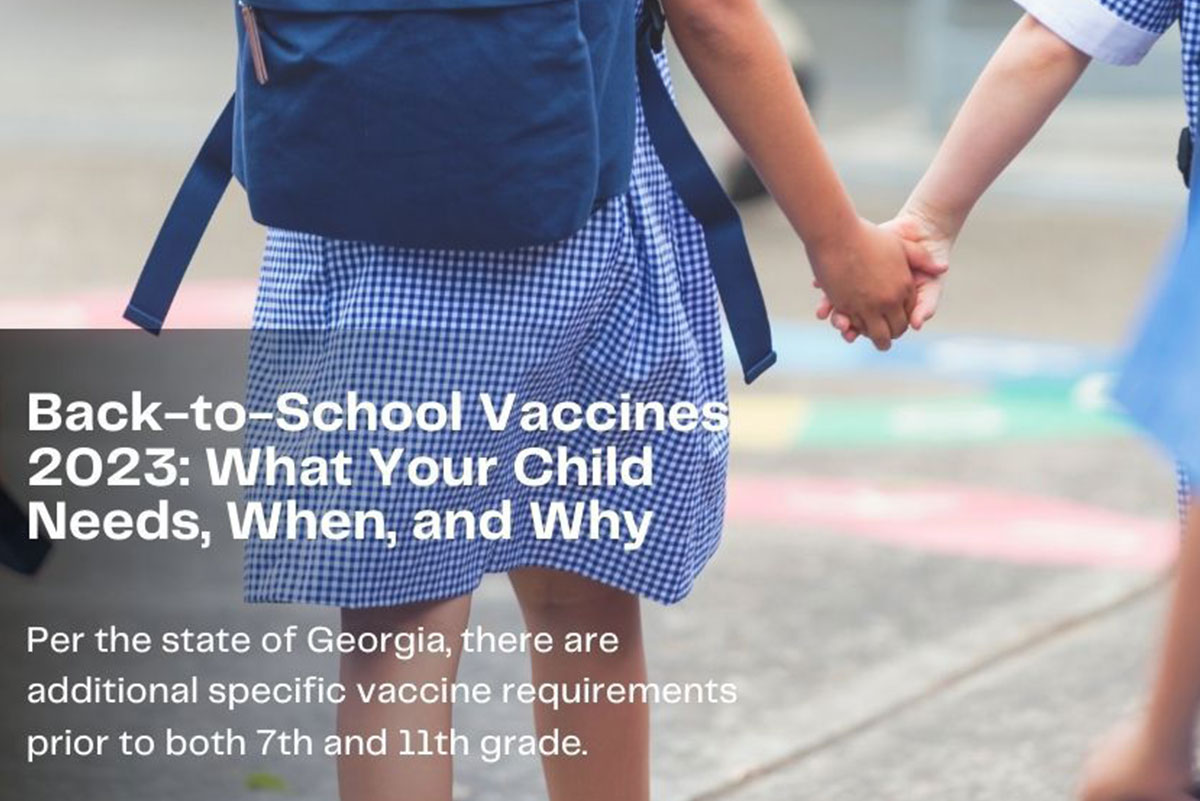Back-to-School Vaccines 2023: What Your Child Needs, When, and Why
July 11, 2023
Categories: Pediatrics
Per the state of Georgia, there are additional specific vaccine requirements prior to both 7th and 11th grade.
As the back-to-school season arrives along with the mile-long supply lists and hours of shopping to find the perfect backpack, outfit and shoes, you also find yourself receiving constant emails, letters and various communications galore about necessary immunizations that your kiddos will need prior to returning to school.
You may think after you made it through all of the requirements to initially get your child into school for kindergarten that you are set, but that is not the case! Per the state of Georgia, there are additional specific vaccine requirements prior to both 7th and 11th grade.
For 7th grade (or if you are new to a Georgia School in grades 8-12), all children born on or after January 1, 2002, must have received one dose of the TDAP (Tetanus, Diphtheria and Pertussis) vaccine and one dose of the MCV4 (Meningococcal Conjugate Vaccine).
In addition, if you have a student entering 11th grade, you need to take note of some new requirements there as well. Your rising 11th grader will need a booster to the MCV4 vaccine that they received around 11 years of age unless they received their first dose on or after their 16th birthday.
After receiving the vaccines mentioned above at the appropriate time, you will need to provide your school administration with Form 3231, which is the Georgia Department of Public Health Certificate of Immunization.
What if my child is starting college?
If you have a child entering their college years, you are probably feeling anxious about multiple things – moving out and moving in, is this safe or is that safe, etc. One thing that will also need to be a priority is making sure they have the necessary vaccinations before their admission process can be completed. Each college will have their own immunization guidelines, but if your child is attending a college that is part of the University System of Georgia, they will have to have proof of the following vaccines:
- MMR (Measles, Mumps and Rubella) series
- Varicella (Chicken Pox) series
- TDAP (Tetanus, Diphtheria and Pertussis) vaccine or booster within 10 years
- Hepatitis B series
- MCV4 (Meningococcal ACWY) vaccine and booster if within 5 years
Although not required by most colleges, some additional vaccines are recommended to ensure your college-aged children as safe as possible and healthy. These vaccines include MEN B (Meningococcal B), Influenza vaccine yearly, HPV (Human Papillomavirus) series, and Hepatitis A series.
For colleges in Georgia, the University System of Georgia Required Certificate of Immunization form will need to be submitted to the college’s admission department prior to the admission process being completed.
Where can I get my child’s vaccine record?
Your pediatrician or family practitioner’s office can provide you with the information and forms you need, or you can contact your local health department.
What is a TDAP Vaccine?
It is a vaccine that protects against Tetanus, Diphtheria and Pertussis. Your kids are actually given 5 doses of a similar vaccine -- DTAP -- as an infant and toddler and then the TDAP booster, usually at age 11-12. This vaccine provides protection against Tetanus, an illness that can lead to severe muscle stiffness.
The vaccine also protects against Diphtheria, which can be a very serious disease that may cause your child to develop a thick coating in the back of the nose or throat, making it difficult for your child to breathe or swallow.
Lastly, it also protects against Pertussis, or Whooping Cough. Pertussis can be a potentially serious and even deadly disease that presents with symptoms of violent coughing fits. This vaccine is especially important in infants or individuals in contact with newborns. Newborns are very vulnerable to having serious cases and serious complications from being exposed.
What is MCV4 Vaccine?
It is the Quadrivalent Meningococcal Conjugate Vaccine, which means it protects against A, C, W and Y serogroups of the disease. Meningococcal disease is a bacteria that can cause infections of the lining of the brain and spinal cord as well as bloodstream infections. It can be devastating and debilitating, having a 10-15% fatality rate. As noted above, this vaccine is normally given with an initial dose at age 11-12 and a booster dose prior to entering 11th grade.
What is the MEN B Vaccine?
It is very similar in characteristics to the MCV4 vaccine but protects against the B serogroup of the disease which is not covered by the required MCV4 Vaccine. It is especially important for adolescents/young adults who will be starting college or joining the military as living in close quarters with others, such as in dorms or barracks, increases the risk of getting meningitis. This vaccine is typically given in 2 or 3 doses, depending on the manufacturer. It is recommended to be given at ages 16-23.
Are these vaccines safe?
Yes, these vaccines are safe. These vaccines have prevented millions of cases of serious and sometimes debilitating or even fatal illnesses. Side effects are mild for the vast majority of children who receive them. Vaccines are so successful that some diseases we used to routinely vaccinate against, including Smallpox and Polio, have been eradicated in America. Reports you may have seen linking childhood vaccines to conditions such as autism have been proven false.
Get ahead and prepare for the back-to-school season by contacting your child's physician's office to schedule these vaccines if you belong to any of the mentioned categories. This will help you stay ahead and be fully prepared for the upcoming school year!



